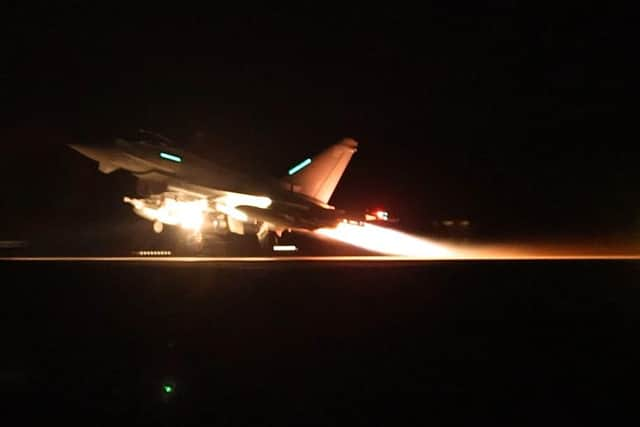SNP accuse Rishi Sunak of 'grandstanding' over Houthis and warns Britain no longer global player
The UK is no longer a global player and should reassess its actions in the Middle East, the SNP’s defence spokesperson has claimed.
Martin Docherty-Hughes claimed the state of the military was in dire need of more funding and also criticised defence procurement as “Byzentian”.
Advertisement
Hide AdAdvertisement
Hide AdSpeaking to The Scotsman, the West Dunbartonshire MP also accused the Prime Minister of “grandstanding” with Britain’s role in strikes against the Houthi rebels in the Red Sea. His comments came as Houthi rebels launched a missile on Friday toward a US warship patrolling the Gulf of Aden.


Discussing Britain’s role in conflict overseas, Mr Docherty-Hughes suggested the idea Britain was still a global player was “completely untenable”.
He said: “The fall in numbers in the armed forces should set the alarm bells ringing. We also had the chief of the defence staff flying the flag on conscription in case there’s a physical war with Russia.
"There are two sides to that – he’s just flying a flag, saying ‘hello everybody, this is a possibility’. But more about saying to the Government, and the Labour party as well, that the denigration in the armed forces is untenable.
“There are two reasons for that, which we in the SNP are very clear about. There is the utter disaster of the nuclear enterprise. It’s not just about the morality of nuclear enterprise, it’s about the financing of it, the sustainability of it, and if it is actually a proper mechanism for defence. Does that kind of deterrent have any place in modern warfare?


“The black hole that we think is destroying the armed forces is the nuclear enterprise. It’s also dollar dominated. Any idea that the UK has an independent nuclear deterrent is absolutely farcical, and everyone, even in the Labour party, knows it.”
Mr Docherty-Hughes was also critical of the Ministry of Defence’s procurement, labelling the processes “Byzentian”.
He added: “Actually, [Byzantine] might have had a better situation. That is clearly controlled by people who are trying to safeguard their own positions, not looking at what is the most capable way of looking after and investing in the armed forces.
Advertisement
Hide AdAdvertisement
Hide Ad“The idea that the union for us offers security critically in our home territory, notably in the North Atlantic and the High North, is not sustainable. You have two aircraft carriers, one which has been off kilter, one out in the Indo-Pacific. At one point we had all the submarines up in bricks, and a range of vessels out in the Red Sea and the Gulf which were breaking down in a continuous process. How that gets by without proper scrutiny is extraordinary.
“The UK cannot maintain any credibility on so-called Global Britain when they have this blinkered view about capability and spend.”
The SNP front bencher was speaking amid an ongoing row over the UK’s role in military action in Yemen, having joined the US in attacks against the Houthis.
Asked if Britain could still be interventionist, Mr Docherty-Hughes raised issue with the term and questioned what role the UK could actually play.
He said: “It’s an interesting term ‘interventionist’. I would be opposed to interventionism on a single state. The last UK intervention was into Libya under David Cameron and it was a disaster. No plan, it was grandstanding, and the capability has diminished since then.
“Rishi Sunak is sending four fighters, is that really adding to what the United States is doing?
“I would say maybe the UK should be allowing the US to be getting on with that, and turning its focus to the High North and the North Atlantic.”
Despite this, Mr Docherty-Hughes insisted he wasn’t against action as a rule, but took more issue with the lack of a “real plan”.
Advertisement
Hide AdAdvertisement
Hide AdHe said: “Ten years of fierce aerial bombardment by Saudi Arabia has not calmed this down in any shape or form. You can throw all the aid at this, but if you’re not dealing with long-term issues, if you’re not proscribing the Iranian Revolutionary Guard, why? If you’re not trying to cut off that supply, why?
“Our concern is that just adds to the pressure in that entire political region. Whether it be Israel’s relationship with Lebanon, we’ve seen some of the ratcheting up of words between Hezbollah and Netanyahu, the utter devastation in Gaza.
“The government will say these are not linked, but I don’t know how they can get away with that in the face of what’s going on.
“What Sunak is doing is grandstanding. Do four Typhoons make a serious impact when someone else could be doing it in that region? We should be concentrating on investment in Ukraine, and reconfiguring our position in the North Atlantic.”
Asked if the UK should have done nothing, the former SNP chief whip questioned what impact bombs could have. He said: "Firing these missiles, which I think are about £2 million a pop, is not going to solve the crisis of the supply from Iran. I don’t know if this answers that longer-term threat unless it becomes some kind of long-term project of military engagement in the Red Sea, which I think is not only unsustainable, but bloody dangerous.”
Turning to the situation in Gaza, Mr Docherty-Hughes warned the relentless bombing was creating long-term problems, and accused the West of taking their eye off the need for a two-state solution.
Israel launched its massive air and ground assault on Gaza after Hamas militants stormed through Israeli communities on October 7. The offensive has decimated vast swathes of the territory and driven nearly 85 per cent of its 2.3 million people from their homes. More than 26,000 Palestinians have been killed.
Mr Docherty-Hughes said: “I think the broader international community agrees that trade needs to flow on all sides. In the longer term, how do you resolve that situation in Yemen without talking to people? There has to be a process in which there is engagement.”
Comments
Want to join the conversation? Please or to comment on this article.
